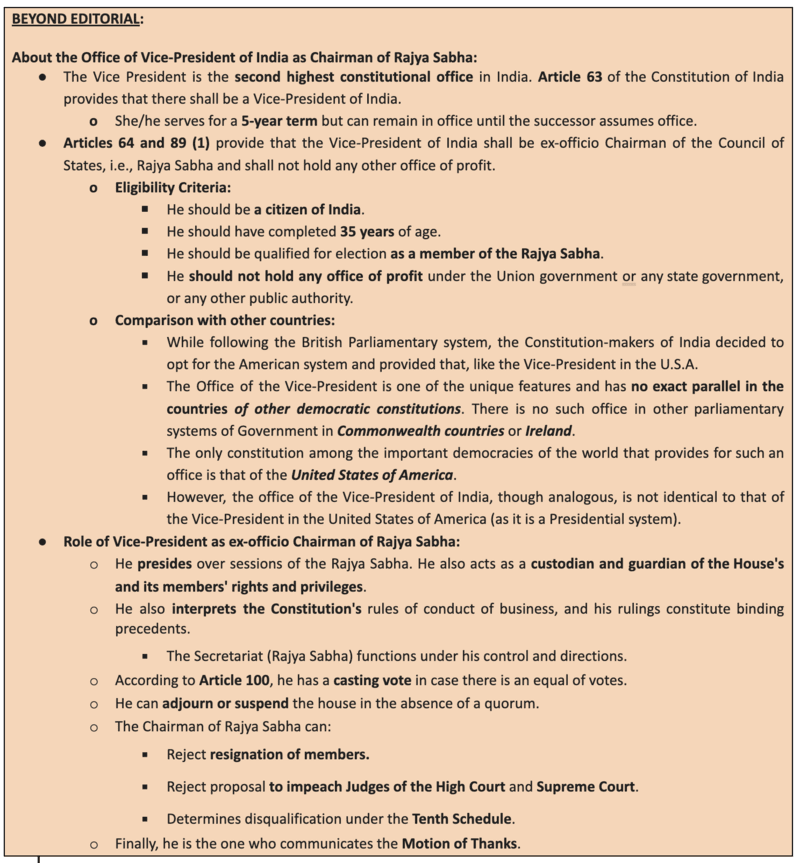Heading the House
“Anyone who claims to be a leader must speak like a leader.” – Kamala Harris
Relevance: GS II (Polity and Governance)
- Prelims: Parliamentary System; Union Government; Rajya Sabha;
- Mains: Parliamentary System and Democracy in India;
Why in the News?
The role of the Vice-President of India in conducting the proceedings of the Rajya Sabha as its ex-officio Chairman is often mired in controversies, such as being the “cheerleader” of the government.

What is the criticism faced by the Office of Vice President in India?
The reckoning of National leaders like Gandhi, Nehru, and others that the presiding officers of the legislature should act like neutral judges has come to a cropper, particularly since the 1960s as follows:
- On Political Influence:
- Lack of neutrality due to political affiliation: According to H V Kamath (Indian politician and member of the Constituent Assembly from 1977-80), “The Speaker is almost always a party man. Speaker who is a member of the party in power cannot be expected to be impartial and of complete integrity”.
- The Supreme Court has repeatedly highlighted the trends of presiding officers acting against the constitutional duty of neutrality and even urged Parliament to pull up its socks.
- On Removal Process: The removal process of the Vice President of India is quite simple and does not require any impeachment as the President’s post attains.
- On his limited Powers: The Vice President does not have many powers close to the President but only holds the position of ex-officio Chairman of Rajya Sabha and power similar to the speaker of Lok Sabha.
- It is the only constitutional post that does not get a salary according to the designated post but only for the duties performed by presiding over RS sessions.
Way Forward:
- Understanding the Dual Burden: The Vice-President of India has been clothed with a dual capacity as the second head of the Executive and as the Presiding Officer of the Upper House of Parliament. This naturally casts an enormous burden of responsibility on the holder of the two offices.
-
- Dr B R Ambedkar had explained that the position of VP was that of the Chairman of the Council of States and that they were similar to those of the Speaker of LS.
- Change in the existing functioning: If the existing additional functions (ex-officio Chancellor of universities) are inadequate, a few other non-controversial roles can be assigned (as in committees of sports, culture, foreign relations, and the Inter-State Council).
- Formation of New post: The Rajya Sabha habitually elects its Deputy Chairman for a six-year term. The new post of the in-house Chairman can be readily included in that format.
- Alternatively, a two-year term may be fixed for both Chairman and Deputy Chairman, that is, after each biennial election, RS would elect them in one go.
- This will help to reflect the prevailing in-house political trajectory.
- Need for democratic and federal credibility: The Chairman should not allow his mind to be influenced by the knowledge acquired in his capacity as the Vice-President. While performing his duties as Vice-President, he should not do anything which may impair his obligation as Chairman.
Mains PYQ
Q. Discuss the role of the Vice-President of India as the Chairman of the Rajya Sabha. (UPSC 2022)
Q. To what extent, in your view, the Parliament is able to ensure accountability of the executive in India? (UPSC 2021)
Prelims PYQ
Q. Consider the following statements: (UPSC 2013)
- The Chairman and the Deputy Chairman of the Rajya Sabha are not the members of that House.
- While the nominated members of the two Houses of the Parliament have no voting right in the presidential election, they have the right to vote in the election of the Vice President
Which of the statements given above is/are correct?
(a) 1 only
(b) 2 only
(c) Both 1 and 2
(d) Neither 1 nor 2


